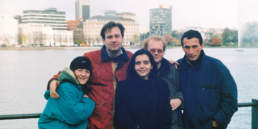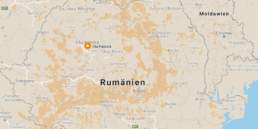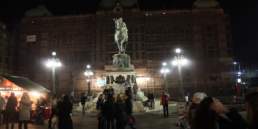In the past week, Romania was the greatest hotspot in Europe. Several 100,000 people went on the street and protested against a controversial decree that would have shielded many politicians from prosecution for corruption. Yesterday the government announced that they would rescind the decree that would have decriminalised abuse of power offences where sums of less than 44,000 euros were involved. But the protests go on, until it really happens. Among the protesters are also many AEGEE members. The Golden Times asked three of them: Cristina-Maria Apostu, Public Relations Coordinator at AEGEE-București, Gabriela Geana: former Vice-Chief Editor of The AEGEEan magazine, and Koen Berghuis (AEGEE-Cluj-Napoca), former Netcom and Medcom member, who lives as freelance journalist in Bucharest (photo above by Koen Berghuis).
GT: After a week of massive protests, the Romanian government announced that they will withdraw the disputed decree that would roll back anti-corruption efforts. Are you happy? Do you actually trust the announcements?
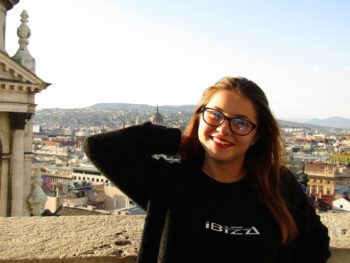
Gabriela Geana: Honestly, I cannot be happy or sure about it until they actually do that. Either way we are still going out in the streets, there is still work to do!
Cristina-Maria Apostu: First of all, they have announced that the Urgency Ordinance no 13 will be abrogated during an extraordinary meeting today. This is just about the changes in the Penal Code which would have taken effect on 10th February. This doesn’t mean that the law aimed for easing overcrowded conditions in prisons won’t remain in Parliament. The fight is not over yet.
Koen Berghuis: Happy is a big word for a law that should never have been submitted in the first place, relieved is a better word as it again proved that the Romanian people can achieve great things when they stand united for a common cause. Yet I do not think that it will be over. Nobody believes that the government’s reason for the law: to handle the overcrowding of prisons. Everybody knows this is purely done for some socialist bigwigs. Some people point at the lawyerish language in which it was communicated that the emergency ordinance will be withdrawn. Might there be some fine print to it? While I doubt they will simply go on with the emergency decree and do think they will completely pull this back, I cannot see why they will not continue with their efforts to legitimise corruption in their own ranks. They will just look for some other means to get it through somehow – I highly doubt we have heard the last from this, unfortunately.
GT: What’s the ultimate aim of the protest? To make the government resign? To change back the new laws? New elections?
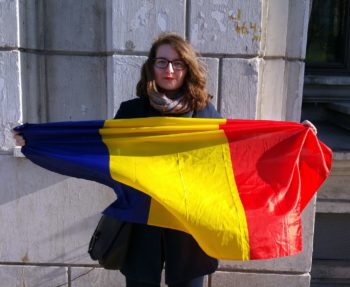
Gabriela Geana: First of all, we want for the government to withdraw that Ordinance and eventually quit, because no one will want this government to stay any longer. I think they already did enough too fast. If they quit before they withdraw it, the Interim Government won’t be able to withdraw it and we will be stuck with it. I think the next step after that will be to vote on a new government. Hopefully, the right people will come to vote this time and vote for the right people. In any case, the Social Democratic Party has fallen and less people will vote for it again after just what happened.
Cristina-Maria Apostu: Personally, I want democracy to be respected. This is not what has happened. It was: to take a decision, on Tuesday night, when people can’t go to protests because the most of them go by metro and the metro stops running at 11 pm – and most of the people have to work in the morning… The government took the decision after several protests and a “public consultance” had taken place. And the most important: the decision about this Urgency Ordinance was not on the public agenda! On the agenda was the national budget! Nobody expected that this will happen. And about people: I think people got tired… It is a fact known by everybody that a lot of politicians are accused of abusing power…
Koen Berghuis: First and foremost the aim is to make the government listening to the people – who are all livid at the law – so taking it back would indeed be the biggest step of all. Second, Romanians are growing increasingly impatient with corruption and lack of accountability of politicians. Just retracting the law won’t be enough – a whole different mindset of many of the country’s politicians is required.
GT: What does the government want?
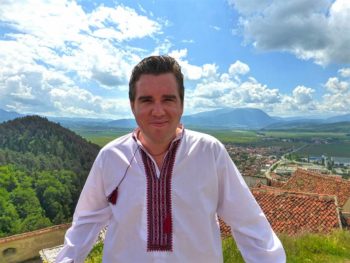
Koen Berghuis: The government said it proposed the law to ease overcrowding in prisons, and to let “small non-violent offenders” go free as they got some slack on the state of the prison system. Yet conveniently, one of those who will directly profit of this law is socialist leader Liviu Dragnea himself, as he was convicted for abuse-of-office in a case involving electoral fraud, for which he received a two-year suspended sentence in April 2016. The law would not only halt current investigations to some corruption and abuse-of-power crimes, it would also set free some corrupt officials serving time in jail and wipe the criminal records of some who have already been convicted, among whom Dragnea.
GT: Dragnea wanted to become Prime Minister himself, but wasn’t allowed, right?
Koen Berghuis: Because of his criminal record, the socialist leader could not name himself as new Prime Minister of Romania even though his party won last December’s parliamentary elections, with his rival – the liberal President Iohannis – saying he would block every nominee with a criminal record. Dragnea in the end decided to nominate his close ally Sorin Grindeanu for the office of Prime Minister. Another prominent figure who could profit from the new socialist law is Dan Voiculescu, one of Romania’s richest businessmen, who is currently serving a ten-year prison sentence for abuse of power and money laundering. Voiculescu, a known ally of Dragnea, has an influential media empire known for its socialist sympathies.
GT: You went out and protested every day?
Cristina-Maria Apostu: Almost every evening, yes. It started on the 22th January. Also, in the past three evenings I was there with other volunteers to share hot tea for the protesters, because it was getting cold.
Gabriela Geana: Apart from 22nd January when it was the first protest and I had guests, yes, every time a protest was organised I came.
Koen Berghuis: Due to some demanding weeks at work that was not really possible time-wise, but I managed to go three times .

GT: When was the first day of the protests?
Koen Berghuis: The first day of the protests was immediately when the law was proposed to decriminalise corruption and abuse-of-office offences for sums of less than 200,000 lei, which is 44,200 euro, on 18th of January. That happened all very spontaneous. I only managed to visit the protests on the 22nd – when also Romanian president Klaus Iohannis participated – and on the 1st of February.
Cristina-Maria Apostu: The second protest was on the 29th. And then the next on Tuesday, 31st. It is called “the Black Tuesday”, when the Urgency Ordinance was adopted. At 11 pm people went directly to the government building and from then on there were protests every night.
GT: How long did you stay out during the protests? And what did you do during the protests?
Gabriela Geana: It mostly depends on the weather forecast. As it is winter, you usually cannot stay much more than two hours. But there are people who volunteered to serve you tea or give you sandwiches to make it easier for you to stay
Cristina-Maria Apostu: I was there for two to five hours. Firstly, with protest cardboards, then with hot tea.
GT: Is there some programme, some coordination of the protests?
Koen Berghuis: For most, people are just chatting, chanting and trying to stay warm! Remember that these are protests that really came from the grass-roots and immediately started when the law was proposed. When the socialist government then passed the law in an emergency ordinance – bypassing parliament – even more massive crowds full of anger took the streets. The only real form of coordination are people creating Facebook events and inviting each other to come too, but it’s not that there is one main organiser or that it is a partisan protest.
Cristina-Maria Apostu: Yes, people organize themselves on Facebook, on the page of the event. The information is shared, so everyone knows that at 10pm we sing the National Anthem, or that yesterday, at 4:30 they went to the Parliament and they made a Human Chain around the building…
Gabriela Geana: The experience of singing the national anthem together is really amazing, you feel more connected to your country than ever and you feel as if you know everyone around you.
GT: Where is the protest taking place exactly?
Cristina-Maria Apostu: In the capital the main protests are in Piaţa Victoriei, Victoria Square, in front of the Government. It’s a central zone, with business buildings.
Koen Berghuis: There have been protests all over Romania: in Timișoara, Cluj, Ploiești, Sibiu, Iasi, Alba Iulia. The biggest ones were of course in the capital, with the protest on the 1st of February attracting around 150,000 angry Bucharest citizens.
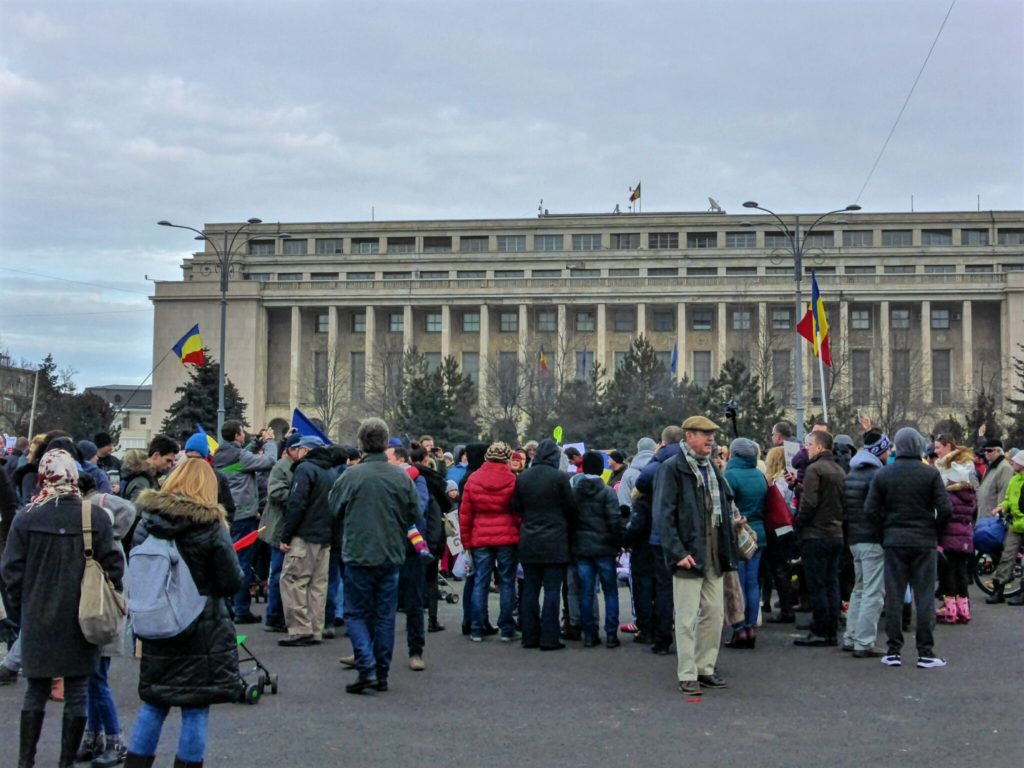
GT: Were you going out together with other AEGEE-Bucuresti members together?
Cristina-Maria Apostu: Yes, with AEGEE-Bucuresti too, we mobilized our members during a few nights, and personally I was with other volunteers that I met on the main Facebook event, where everybody comes with solutions or creative ideas.
Gabriela Geana: So far I didn’t manage to meet with them as I am staying with my two sisters and their friends, but I know that some of them are meeting together. Hopefully I will do that as well tonight.
Koen Berghuis: One time I went alone and the other time I went with some non-AEGEE friends.
GT: How many members of your antenna have been participating in the protests?
Gabriela Geana: I cannot say for sure, but I think everyone, as everyone I know is against this ordinance.
GT: The corruption problems are widespread. Is the EU doing enough to help your people? Should it intervene, also beyond the possible withdraw of the decree?
Gabriela Geana: The EU is fully supporting us and from what I understood they can cut off our European funding if the government doesn’t withdraw the Ordinance. In other ways they cannot intervene. For sure, we will have a bad reputation among the other EU countries and eventually it can be a downfall for us.
Koen Berghuis: The foreign community is doing a lot, be it from EU level, or from the level of individual countries who have a lot at stake. I doubt they can do more to influence the Romanian government as the pressure they are putting is already big.
GT: Many people are surprised about the ruthlessness of your government to bend the laws as they like. You too? Or were you already too much used to this kind of politics?
Cristina-Maria Apostu: I am sad. Because everything that happens here affects us. The reputation of Romania is affected. I feel disappointed because every Romanian’s effort for improvement and good evolution is erased by this fact, which will decrease the trust of the people in Romania.
Gabriela Geana: Well, I must say that this time they really did it, they tried to fool us in our face, but they won’t get away with that.
Koen Berghuis: I was not really surprised, although this was even for the socialists quite a blatant move. Remember that the country has had to come a long way. Only in 1989 the communist regime was chased away and Ceaușescu executed. In the 1990s, the country stood still under the democratic government of former communists who reinvented themselves as socialists. Only in the 21st century, real steps forward to tackle corruption were made. The old ways of communism and the lack of rule-of-law from the years after, still exists. While the socialist party has historically been the most blatant abuser of power in Romania, it also exists within other parties too. Yet the country was making real progress, with great economic growth, an independent anti-corruption agency (DNA) which works great, and a new set of political leaders who are more technocratic in nature, like President Iohannis and former Prime-Minister Dacian Cioloş. It is just a pity to see the country going back to the ways of the 1990s with this new government.
GT: On the positive side, in recent years some protests were successful…
Koen Berghuis: It is great to see that already for the last five years, especially the young, urban generation is taking increasingly control of their own destiny and is playing a vital role in controlling the government. Protests were already successfully held against the controversial mining project Rosia Montana, as well against the prior Ponta-government. After the Colectiv nightclub fire which killed 64, thousands of people also took to the streets to protest against corruption and for accountability, as the club lacked the right permits and a lot of local political cronies were caught up in the ensuing scandal. It took just a few days of protesting back then to make the Ponta government resign, so the Romanians do have a track record when it comes to this. O the other hand, even after all scandals in the prior socialist government of Ponta, his party still managed to get a resounding victory in the elections last December as especially lots of young people stayed home in a low turnout. The Socialist party obviously feels emboldened by this and will not easily give up power after just two months, even retracting this one specific law would be seen as a huge loss by them.

GT: Indeed, despite the fact that the main government party has a record of corruption and acting against democracy, it won the election in December, also thanks to making many election promises. Most other parties don’t have a good public image either. What’s the way out, the way to make Romania more democratic?
Cristina-Maria Apostu: We need young people who fight for personal improvement. We need a lot of higher education and NGO involvement, because information means power. The change will come with time… We need years and step by step people become aware of Romania’s politics. Changing the mindset takes time. To remove the indifference of some young people takes time… and to vote is also important.
Gabriela Geana: The way out would be to encourage more young people to vote for a democratic party and not let the old people fooled by the growth of pensions to get in the way of that.
Koen Berghuis: Promising people the world and handing out free flour and stuff like that still works in some parts of the country, especially with the older generation. Luckily, the young population is sick and tired of it, so with time passing this will only grow better automatically. This is how history works – you cannot shake of old communist habits instantly. But of course, people are rightly angry and do not have the patience to wait. The only other way out is to keep up the pressure, and make sure that the next time everyone also gets out to vote, as this unfortunately did not happen during last elections. If the young generation takes ownership this way, automatically new leaders will step up too, and old ones will be forced out.
GT: Romania joined the EU ten years ago. Do you actually see progress in the development of your country, or benfits of the EU accession?
Cristina-Maria Apostu: Of course, especially because a lot of projects are implemented with the help of the EU. I see the difference between me and my older brother. He did not have so many opportunities as I had: to travel, to meet foreign people, to study abroad. I think it is an improvement for the social and the education. About politics: I can’t tell you. I was very young in 2007 and regarding the period before 2007: I don’t want to speak about facts that I don’t really know.
Gabriela Geana: I see a very big progress in my country and that is the reason why any of us doesn’t want to let this happen. We managed to choose a great president, who is democratic, and we also succeeded in fighting corruption, thanks to the National Directorate of Anticorruption (DNA). This is progress which has been seen and praised by the EU. We had some financial downfalls at some point, but I think it is normal when you want to make progress and it was temporary anyway. I must say that being in the EU means corruption is not permitted and must be vanished. That is the reason why the DNA also appeared – and thanks to that, we are a country which is gradually evolving and growing into a democratic one for good.
Koen Berghuis: I see tremendous developments. Romania is perhaps one of the few European countries where there is no significant anti-EU sentiment. Besides the obvious economic benefits in trade and subsidies, it is mostly the values and mindset which is a benefit, for example in putting pressure to make anti-corruption programmes succeed.
GT: Koen, do you remember your first visit to Romania? What has changed?
Koen Berghuis: My first visit to the country was ten years ago, and it is a whole other world now. Just compare Bucharest alone: back then there were thousands of stray dogs, part of the old-town was a no-go area at night with dodgy characters, infrastructure was a mess. While still some things, like for example some hospitals and the roads and railways, could still benefit from more investment, a lot has developed amazingly fast. It is no surprise that Romania is among the five best-performing economies in Europe. The best way to look at it is this: 10 years ago almost everyone would still have said that in order to have a great career and a future it would be best to leave the country to Western Europe, Italy or Spain – places with a huge Romanian diaspora. Besides obvious better salaries, people also left because they thought the old system would never change.
GT: And now?
Koen Berghuis: Now people are increasingly seeing their future here in Romania, and they see that they have the power to make this country even more beautiful and great than it already is. In my opinion, the Romanian population is really showing the way in the entire of Europe how much power they can have if they take control of their destiny.
GT: Is there any action that your antenna can do to foster democracy in your country?
Gabriela Geana: We can keep organising projects about civic education to reach as many young people as we can and make them aware of active citizenship to encourage them to contribute to the society and improve it.
Cristina-Maria Apostu: We can continue to help young people to understand what democracy means, continue to create opportunities for them. The change comes from each of us.


